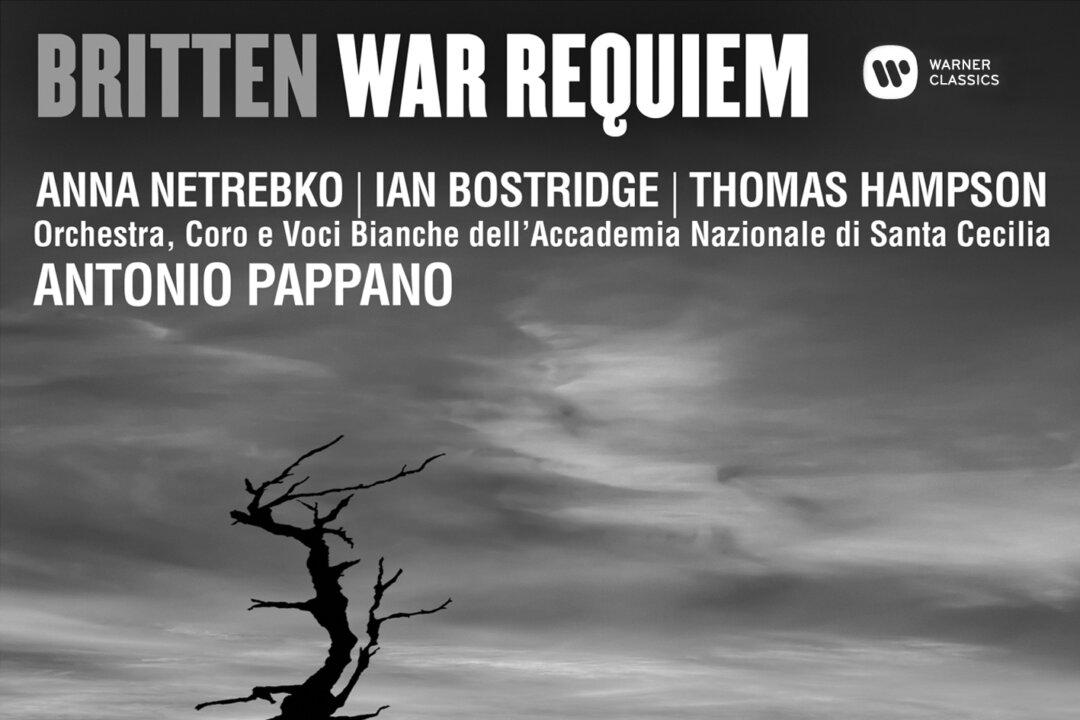To honor what would have been English composer Benjamin Britten’s 100th
birthday—he died in 1976—Warner Classics released a magnificent new
recording of his “War Requiem.”
Britten was a pacifist and he had considered writing an oratorio about the
horrors that had occurred during the first half of the 20th century,
including the devastation of World War II, the bombings of Hiroshima and
Nagasaki, and the assassination of Mahatma Gandhi.
These ideas gestated over a period of years, during which he completed
operas and other works. In 1958, Britten was asked to write a piece to
commemorate the consecration of a cathedral that was being built in
Coventry, England.
The church in that city had been standing since the 15th century but was
destroyed during a bombing by the German air force in 1940.
The composer conceived a large scale work for chorus, orchestra, and
soloists. It was written, in Britten’s words, “in memory of those of all
nations who died in the last war.” He decided to mix the Latin text with
poems by Wilfred Owen, the English poet who died in the trenches during
World War I. Ironically, the war ended one week after he was killed.
Britten quoted Owen on the title page: “My subject is War, and the pity of
War. / The Poetry is in the pity ... / All a poet can do today is warn.”
To convey the universality, for the debut performance, Britten chose
soloists from three countries that fought in World War II: Russian soprano
Galina Vishnevskaya, English tenor Peter Pears, and German baritone Dietrich
Fischer-Dieskau (who had been drafted into the German army and spent two
years as a prisoner of war by the American forces).
The Soviet government wouldn’t allow Vishnevskaya to appear at the work’s
premiere in 1962, though she was allowed to take part in the recording the
following year. Because she told the composer she could not sing in English,
he had her perform the Latin texts.
The new recording features soprano Anna Netrebko, tenor Ian Bostridge, and
baritone Thomas Hampson with the Orchestra and Chorus of the Accademia
Nazionale di Santa Cecilia conducted by Sir Antonio Pappano. Again, there is
a Russian soprano and an English tenor but the baritone is an American
rather than a German.
The recording stands up to the original. All three sing sensitively, with
Hampson superior to Fischer-Dieskau in the projection of Owen’s poetry.
Bostridge produces a bell-like tone making the more lyrical portions sound
even more eerie—he is at home with Britten’s music and coincidentally
recorded the composer’s songs with Pappano playing piano. Netrebko is a
powerhouse, matching Vishnevskaya in dramatic force.
The sound quality is exceptionally clear. Whether the chorus is singing
about the “day of wrath,” the soprano and chorus are begging the “fount of
pity” to save them, the baritone is contemplating “the great gun towering
toward Heaven,” or the tenor is singing of the “passing bells for those who
die as cattle,” the effect is one of absolute horror at war’s devastation.
Unfortunately, the tragic work is as timely today as when it was written.
Netrebko is currently appearing at the Metropolitan Opera in Donizetti’s
comic opera, “L’Elisir d’Amore” (until Feb. 1) and Hampson will be appearing
there in Berg’s tragic opera “Wozzeck” (March 6–22).






